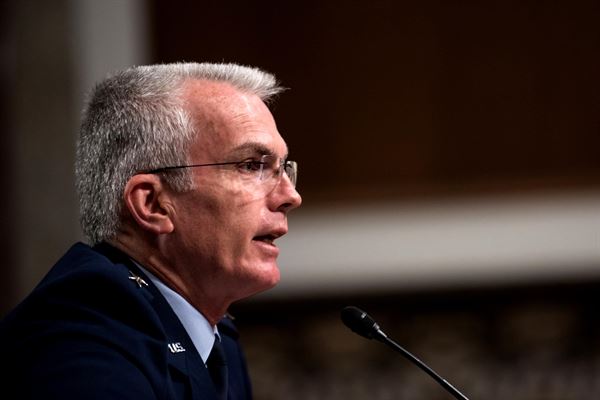In a hearing set to determine the viability of serving another two years as the vice chairman of the Joint Chiefs of Staff on Tuesday, Air Force Gen. Paul J. Selva addressed concerns about global threats, and about how budget restrictions effect America’s ability to counter them.
The first issue the General was asked to discuss came as no surprise to many in the defense community; North Korea serves as what some believe to be among the most significant threats the United States has faced in recent history. Selva stated plainly that, based on assessments of North Korea’s most recent long-range ballistic missile test, Kim Jong Un’s regime now possesses the technology necessary to reach the United States.
“I’m reasonably confident in the ability of our intelligence community to monitor the testing, but not the deployment, of these missile systems,” he said. “Kim Jong Un and his forces are very good at camouflage, concealment and deception.”
Questions and concerns about North Korean ICBMs directly led to another important issue regarding our nation’s ability to defend against such threats: the state of military readiness. Selva explained that readiness in our military infrastructure stems from “the availability of funds and resources to do the high-end training required for high-intensity combat against a peer competitor.”
The budget in ’17 is helpful,” Selva said. “The proposed budget for ’18 will move us down the pathway to being able to restore much of that training. But it will be a two-year process, beyond the initial insertion of those resources, before you see the readiness improve.”
Sequestration, which is a number of spending limitations placed on defense during the Obama administration, has strangled funding from many programs intended to maintain America’s global military footprint, as well as those tasked with training military personnel.
“For all the heartache caused by the loss of our troops during these wars, no enemy in the field has done more to harm the readiness of our military than sequestration,” American Secretary of Defense James Mattis told Congress last month. General Selva did not word his budgetary concerns quite so directly, but still made them apparent.
In regard to the ongoing fight against the Islamic State in Iraq and Syria, Selva warned that although Iraqi Security Forces have successfully retaken Mosul, “a lot of fighting remains.”
“There must be a push into Iraq’s Anbar province to secure the border with Syria,” the general said.
Selva closed out his hearing by discussing the technological focus America must maintain as a part of its Third Offset Strategy, championed by Deputy Defense Secretary Bob Work last year at the Center for Strategic Studies. Offset strategies are employed as near-peer competitors develop combat systems that are approaching parity with our own, so new concepts must be employed to retain battlefield superiority. Often, these strategies include finding new ways to utilize existing systems and platforms, but in the realms of orbital and cyber security, they will likely require all new solutions, designed to match all new threats.
“The American military’s greatest advantage is to be able to project power and then sustain that power once where needed,” Selva said. He went on to explain that protecting that capability would remain the focal point of the America’s defensive modernization strategy under his leadership.
Already have an account? Sign In
Two ways to continue to read this article.
Subscribe
$1.99
every 4 weeks
- Unlimited access to all articles
- Support independent journalism
- Ad-free reading experience
Subscribe Now
Recurring Monthly. Cancel Anytime.


COMMENTS